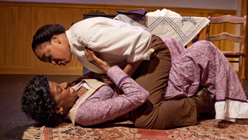You can only imagine that life must have been tough for an African-American lesbian couple living in the South in the 1890s. But Shirlene Holmes’s play A Lady and a Woman doesn’t give that impression at all. What’s striking about the 1995 drama is the relative ease with which prim innkeeper Miss Flora and cheerful tomboy traveling butcher Biddie fall in love.
That impression is at least partly due to the happy-go-lucky openness and confidence with which Dawn L. Troupe plays Biddie in Theatre Rhinoceros’ Bay Area premiere at the Eureka Theatre. From the moment she strolls into the inn in trousers and a cowboy hat, she exudes confidence and seems to have not a care in the world. San Francisco Mime Troupe mainstay Velina Brown is wary and disapproving at first as Miss Flora, but her curiosity and Biddie’s folksy charm get the better of her, and they soon become inseparable. From there you just know that one of the times her lodger leans in patiently for a kiss, Flora won’t be able to change the subject anymore.
Flora worries about what people might think, sure, but her reservations are more basic than that. She’s a very religious woman and wants to be sure that she’s not doing anything wrong. After kicking out an abusive husband, she’d set her mind to live alone. And even if she wants to sleep with Biddie, she says, “I don’t know where the parts go. I ain’t never read no book on this.” If she can get past all that, it’s smooth sailing from there.

One might worry what could happen if they get caught by unenlightened neighbors, but here’s the thing: it’s a two-character play. Nobody’s going to come barging in. That may sound glib, but the scenes between the two women, with days and weeks passing between them, give the impression that they’re in a world of their own, with nobody to bother them. We hear about some town gossip, but they’re not too worried about it, and neither are we. For the most part, life seems remarkably simple — actually much more so than in your usual romance. For once, nothing much goes wrong.




